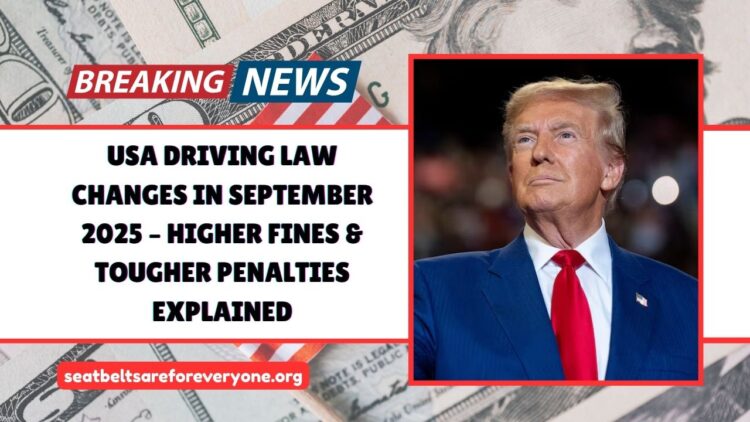Big changes are coming for American drivers this September 2025. Several states are rolling out new traffic laws, higher fines, and tougher penalties. These reforms aim to curb reckless driving, reduce accidents, and bring uniform rules for everyone on the road.
Whether you’re a daily commuter, a professional truck driver, or just an occasional motorist, these updates matter. Knowing the USA Driving Law changes 2025 will help you avoid heavy fines, license suspension, and even jail time.
Why the Laws Are Changing
Lawmakers across the country decided to introduce new measures for several reasons:
- Rising accidents caused by speeding, phone use, and reckless driving.
- The distracted driving epidemic, fueled by smartphones.
- Public demand for safer roads and stricter enforcement.
- Technological shifts, like electric cars and self-driving vehicles.
- The need for uniform standards across states, so interstate drivers face less confusion.
Key Driving Law Changes – September 2025
Here are the most important changes rolling out this month:
| Category | New Rule | Penalty / Consequence |
|---|---|---|
| Distracted Driving | Hands-free only in most states | $250 fine + 2 penalty points (first offense), license suspension for repeat offenders |
| Speeding | Higher fines in school zones & residential areas | $150–$2,000 depending on speed; some states use income-based fines |
| Drunk & Drugged Driving | BAC limit lowered to 0.05% in many states | $1,000+ fine, license suspension, possible jail |
| Seatbelt Rules | All passengers, including backseat, must buckle up | $100–$200 per passenger |
| Reckless Driving | Drag racing & street takeovers targeted | Court appearance, fines over $2,500, vehicle impoundment |
| Electric Vehicles | No blocking charging stations; EV road tax enforcement | Fines for ICE vehicles at charging spots; new EV taxes |
| Automated Monitoring | More cameras & AI sensors nationwide | Automatic fines for red lights, tolls, and speeding |
State-Level Highlights
- California: “No-touch” phone rules mean even holding your device at a stoplight is illegal.
- South Carolina: Hands-free law effective September 1, with fines starting at $100.
- Texas: Autonomous vehicles need DMV permits; “Move Over” law expanded to all roadside workers.
- Nebraska: Speeding fines increased drastically—going 5 mph over now costs $50 instead of $10.
- Pennsylvania: AI-powered school bus cameras issue $300 tickets for illegal passing.
- Florida: “Super-speeder” law makes extreme speeding a criminal offense with fines up to $1,000.
- Montana: Harsh DUI law with mandatory prison if BAC is above 0.16% in fatal crashes.
Impact on Drivers
The new rules will affect drivers in multiple ways:
- Higher costs – Fines are significantly more expensive than before.
- Insurance hikes – Convictions will push insurance premiums higher for years.
- Less escape from penalties – Automated cameras mean fewer warnings and more tickets.
- Professional drivers – Truckers, delivery, and rideshare drivers face bigger risks of license suspensions.
Benefits of These Reforms
While stricter, the reforms bring several benefits:
- Safer roads with fewer crashes and fatalities.
- Fairer systems with income-based speeding fines in some states.
- Support for EV adoption, ensuring charging stations remain accessible.
- Stronger accountability for reckless and repeat offenders.
Public Concerns
Not everyone is happy with the new rules. Some common concerns include:
- Affordability – Low-income drivers fear the high fines.
- Privacy – Automated monitoring raises surveillance debates.
- Consistency – State-to-state variations may still confuse interstate drivers.
Tips to Stay Safe & Avoid Fines
- Always use hands-free devices if you must take calls.
- Follow speed limits, especially in school zones.
- Never drive under the influence of alcohol or drugs.
- Make sure all passengers wear seatbelts.
- Respect EV charging zones if you don’t drive an electric vehicle.
- Stay updated on state-specific rules if traveling interstate.
The USA Driving Law Changes September 2025 mark one of the most significant overhauls of traffic enforcement in years. With harsher distracted driving penalties, income-based speeding fines, stricter DUI rules, and AI-powered monitoring, drivers must be extra cautious.
While these rules may feel strict, they aim to reduce accidents, save lives, and modernize America’s road system. For every driver, the message is clear: stay alert, stay compliant, and drive responsibly.
FAQs
The legal limit is now 0.05% in many states, lower than the previous 0.08%.
Yes, all passengers must wear seatbelts, or face fines between $100–$200.
First-time offenders face around $250 and penalty points, with harsher punishments for repeat violations.
